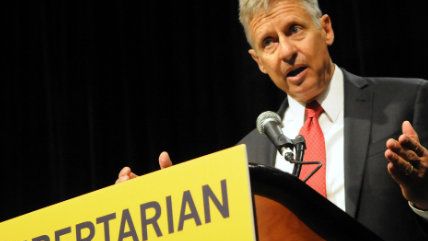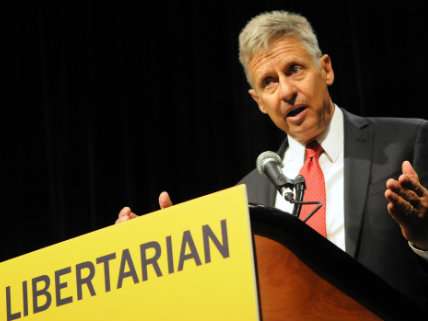Why Gary Johnson Opposes Hate-Crime Laws (and You Should Too)
If I throw a rock through your window, said Johnson, "I should be prosecuted on throwing the rock, not my thoughts that motivated me throwing the rock."


While making a campaign stop in Miami this week, Gary Johnson and running-mate William Weld talked to staff at Fusion, the Hispanic television-station turned multi-pronged millennial media factory. In a write-up of the event, Fusion contributor Andrew Joyce focused on Johnson's rejection of hate-crime legislation—something he vetoed as governor of New Mexico.
"You're talking about me throwing a rock through someone's window," Johnson told Fusion reporters, "I should be prosecuted on throwing the rock, not my thoughts that motivated me throwing the rock through that window."
Joyce isn't convinced by Johnson's answer, which he sums up as asserting "that hate crime legislation constitutes some kind of Orwellian thought policing." But that misstates Johnson's position, making it sound like the Libertarian candidate's opposition is some sort of alt-right, anti-PC paranoia. The problem isn't that hate-crime laws punish people for merely thinking hateful thoughts or holding unpopular beliefs—they don't—it's that they empower the carceral state.
It's also silly to say (as Joyce does) that we punish manslaughter differently than murder based on a person's motivation and hate-crime laws are no different. With the former charges, the motivational difference is the difference between intentionally taking someone's life and doing so accidently or through negligence, not a matter of arbitrarily deciding some criminal intentions are worse than others.
The logic of hate-crime laws, meanwhile, says that while many murders, assaults, rapes, acts of vandalism, and other crimes are committed out of rage and hatred, it's only a narrow type of rage and hatred that deserves extra opproprium—and punishment. A hate crime enhancement can lift misdemeanors into felony territory and potentially double prison sentences.
All of this might make social-justice advocates feel good, but it serves little public-safety purpose. People who commit the kinds of crimes we define as hate crimes, whether calculatedly or spur-of-the-moment, aren't bound by rational thinking—they're not going to be deterred by the fact that their particular bias could, if caught and convicted, add additional time to a theoretical sentence. There's similarly little evidence that extra severe sentencing somehow benefits "hateful" offenders more than offenders of other varieties, thereby facilitating a rehabilitative function.
So what remains as a justification? Vengeance.
And in this way—pushing for punitive sentencing enhancements that serve no deterrent or rehabilitative role—modern progressives fall prey to an all-too-common hypocrisy on criminal justice. That is, their stated preference for sentencing reform, ending mass incarceration, and being "intersectional" in analysis of social and civil issues comes in conflict with their demands for ever more and tougher criminal penalties and a willingness to trust police and prosecutors—the same "public servants" so readily demonized in other contexts—to use their expanded tool-sets for good. But what we've already seen with hate crime laws (and hate speech laws in countries that have them) is that people in power will always use these tools in ways that serve power.
In one early hate-crime case, in 1991, Florida police officers tried to enhance penalties on a man charged with domestic violence because he called the officer arresting him a "cracker." More recently, places like New York City and Louisiana have been pushing to include police as their own protected category within in hate-crime statutes. These "Blue Lives Matter" measures have "always been the unavoidable endpoint of [hate crime] laws," writes Hamilton Nolan at Gawker. "Eventually, every single sub-group of people will have their own hate crime law."
As Nolan shows, it's not just libertarians (or any one side) critical of hate crime laws. Perhaps Gary Johnson didn't do the most eloquent job of explaining his objections to Fusion (Johnson's strong suit certainly isn't giving concise off-the-cuff answers), but it's simply wrong to suggest his opposition is rooted in some sort of libertarian quirk or an immature rejection of political correctness. Scholars, activists, and politicians of all ideological stripes have raised legitimate concerns about not just the efficacy of hate-crime laws but their potential for unintended consequences.
"Seeking another pound of flesh has us veering toward vengeance rather than justice," wrote longtime gay activist Bill Dobbs in 2013. "While racism and homophobia, for example, are deplorable prejudices, social problems cannot be solved with more prison time."
New York University law professor James B. Jacobs concurs: "Sending more people to prison for longer is hardly likely to contribute to a more tolerant society. To the contrary, jails and prisons are breeding ground for hate groups."
"The term 'hate crime laws' is commonplace, but people often do not understand the intent or ramifications of such laws," noted a 2013 piece in The Nation.
Many Americans simply accept the unproven assumption that these laws act as a deterrent. Wade Henderson,president of the Leadership Conference on Civil and Human Rights, states, 'We recognize we cannot outlaw hate. However, laws shape attitudes. And attitudes influence behavior.' He is correct. Laws do shape attitudes. But our legal system does not write laws to shape attitudes; it writes them to justly and fairly punish explicit behaviors. […] The place to change social attitudes, hearts, and minds is not in prisons.
Hate-crime laws may make us feel good about doing something, said Harvard Media Studies Professor Michael Bronski, co-author of Considering Hate: Violence, Goodness, and Justice in American Culture and Politics," in a 2015 NPR interview. But this comes at the cost of ignoring the root causes of social issues. Bronski also cautioned that hate-crime laws are selectively enforced.
"In any case that involves a slur or an element of bigotry, prosecutors can choose to bring hate-crime charges, automatically boosting the penalty that the defendant might face," noted Jacob Sullum back in 1992. And as with all such situations calling for prosecutorial discretion, there's ample room for abuse, as prosecutors wield hate-crime enhancements to coerce deals from defendants or satisfy public bloodthirstiness.
"Hate-crime laws can give prosecutors added leverage in plea bargaining, whether or not the charges would stand up in court," Sullum wrote.
Rather than cheering hate-crime measures (or jeering politicians, like Johnson, who critique them), we should focus on making the laws and justice-system we do have work more equitably for everyone. As Nolan wrote at Gawker, "That is a far thornier and more useful task than watching grandstanding politicians of all political persuasions crank up penalties on specific crimes for purely demonstrative reasons. You would think that after incarcerating two million people we would be skeptical of such remedies, but apparently not yet."


Show Comments (137)